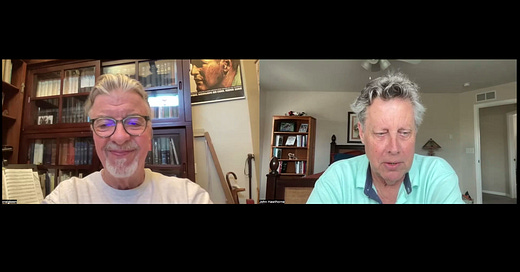My friend Craig Keen retired a few years ago from Azusa Pacific University. Recently on Facebook, he began a set of short reflections on the nature of his career: his undergraduate experience, how he got to grad school, what prompted him to teach, and how he moved between institutions. He seemed like an ideal person to talk with in light of the themes of my Fearless Christian University book.
I hope to do these interviews whenever the opportunity arises. If you are someone who has spent a career in Christian Higher Ed, I’d love to talk with you.
Here’s a NoteGPT summary of our conversation.
In a reflective conversation between two friends, Craig Keen and John Hawthorne, they explore their shared academic and professional histories, insights from their experiences in Christian higher education, and the changes within their faith communities over the decades. The discussion takes root in their personal experiences; Craig shares his unexpected discovery of the significance of a mentorship with John Caputo, which connects him to Pope Leo XIII, while reflecting on his time at various Nazarene institutions. Craig candidly reveals a transformative academic journey defined by his pacifist convictions, which originated from his interpretations of the biblical book of Acts in the late 1960s, influencing his life choices and professional endeavors. His tenure at institutions like Southern Nazarene University, Point Loma, and APU highlights the paradoxes of teaching in environments that often grapple with institutional traditions versus the need for intellectual inquiry. The discussion culminates in a contemplation of the role of Christian universities within a rapidly evolving cultural landscape, emphasizing the importance of faith’s integration with learning and exploring how education can foster authentic Christian identities amidst contemporary challenges.
Key Insights
🤝 The Power of Connection: Craig’s unexpected connection to Pope Leo XIII through friendships exemplifies how personal networks influence professional opportunities and insights. The broader theme underscores the vital role that relational ties play in academia, especially within niche communities like Nazarene universities. The interconnectedness within professional spaces can lead to unfamiliar but enriching experiences.
📚 Navigating Institutional Challenges: The candid reflections on Craig’s experiences in Nazarene institutions expose the tension between preserving institutional traditions and fostering intellectual curiosity. As Craig narrates tales of disillusionment and unexpected joy, it illustrates that the academic journey is often a complex interplay of learning under constant scrutiny while grappling with the fear of cultural and ideological deviations.
🌱 Emerging from Personal Convictions: Craig’s transformation into a pacifist serves as a pivotal personal narrative that shapes his academic focus, leading to his eventual engagement with philosophy and theology. This shift reveals the potential for individuals within academic settings to define their paths based on deep personal convictions, impacting their teaching methodologies and relationships with students.
✏️ Embracing Open Dialogue: The conversation highlights the necessity for Christian universities to nurture environments where students can engage in open discussions on contentious issues without fear of retribution, fostering a culture of honesty and intellectual vibrancy. Craig’s experience suggests that this openness is essential in nurturing a transformative education.
✨ Importance of Community in Education: Expressing gratitude for his academic community signifies a broader truth about education: the significance of positive relationships in professors’ effectiveness and students’ growth. This underscores the premise that authentic Christian education not only transfers knowledge but also cultivates supportive environments where students can flourish.
⚖️ Continuous Learning and Self-Reflection: The necessity for educators to engage in ongoing self-reflection and growth is emphasized, as they’ve constantly adapted their teaching methods and content. Craig illustrates that by learning alongside students, educators cultivate richer academic experiences that challenge norms.
🔮 The Role of Christian Universities: Discussions regarding the future of Christian educational institutions underline their potential for deepening faith while also facilitating critical engagement with contemporary culture. The focus is on how these institutions can inspire students to view their faith as a framework that encourages exploration rather than retreating from societal challenges.
(I’m trying to learn how to get a smooth transcript but haven’t mastered that skill yet.)





Share this post